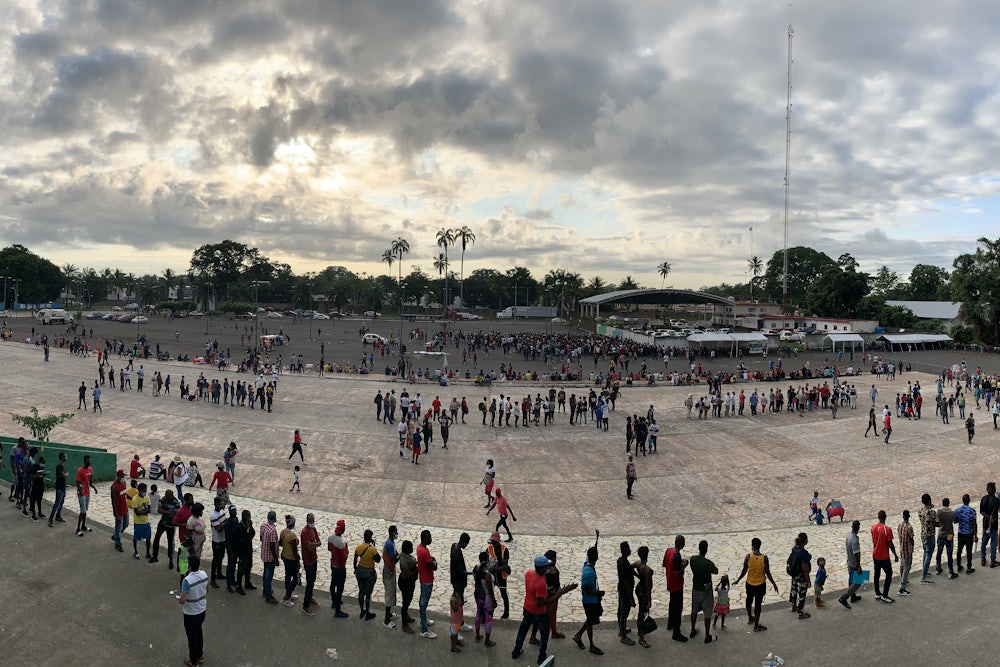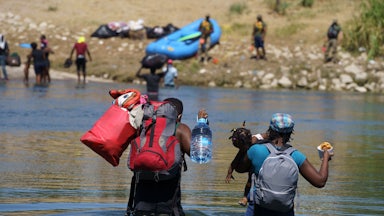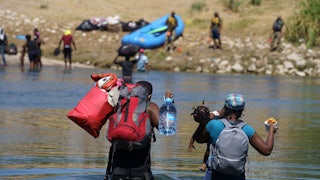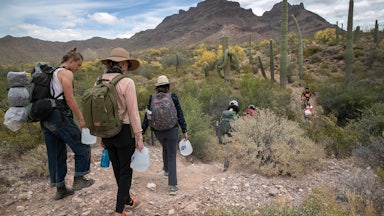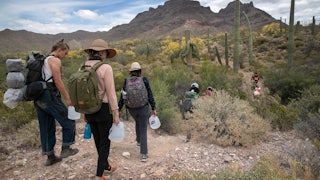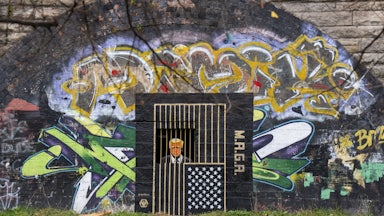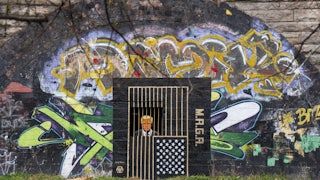The photographs of the U.S. Border Patrol charging at Haitian migrants who had gathered in Del Rio, Texas, last month, were a traumatic reminder for Junior, a 26-year-old asylum-seeker, of what his fellow Haitians have been through already and how the United States might treat him in the future.
“Those images reminded us of images of slavery from past centuries,” he said when I met him this month outside the Olympic Stadium in the Mexican city of Tapachula, on the border with Guatemala, where he and thousands of other Haitian asylum-seekers waited to be registered. “We are in the same combat as previous centuries,” he said. (Junior asked to be identified only by his first name to speak more freely while still in his asylum process.)
Joe Biden’s expulsion of at least 7,621 Haitian asylum-seekers using Title 42, an ostensible public health policy imposed at the start of the pandemic by Donald Trump and maintained by Biden, drew widespread condemnation and violated international and domestic asylum law, according to advocates. But there were few images of a different migration policy that has been continuous across administrations since Barack Obama: The U.S. border is moving further south, and because of U.S. pressure on the Mexican government, there are now at least 30,000 Haitians effectively in detention in Tapachula. They made up 88 percent of new refugee applications in Mexico over the last few weeks, according to the head of Mexico’s refugee agency, Comar.
In 2019, tens of thousands of African, Caribbean, and other migrants took the dangerous journey overland from South America through Central America and into Mexico before approaching the southern U.S. border. After a temporary pause in large-scale immigration due to Covid-19, people from Haiti, Venezuela, Honduras, Cuba, Nicaragua, and elsewhere have resumed their perilous trips in search of asylum in the U.S. And instead of the “fair, orderly, and humane immigration system” promised by his administration, Biden has doubled down on his predecessors’ strategy of having Mexico do America’s dirty work, to the detriment, especially, of Haitians on their way.
“U.S policy has forced Mexico to use Tapachula as a prison state, caging migrants and creating a bottleneck where they’re barely surviving,” said Guerline Jozef, co-founder and executive director of the Haitian Bridge Alliance.
Waiting along with the Haitians are significant communities of Hondurans, Cubans, Venezuelans, Guatemalans, Dominicans, and more. About 800 migrants are being held in the notorious Siglo XXI detention center, but most of them are in an open-air prison bound by the city limits: Migrants must be granted refugee status in Mexico to leave Tapachula, and that onerous process can take months. Frustrated with the situation, about 1,000 people left Tapachula on foot in a caravan headed for Mexico City on Saturday night.
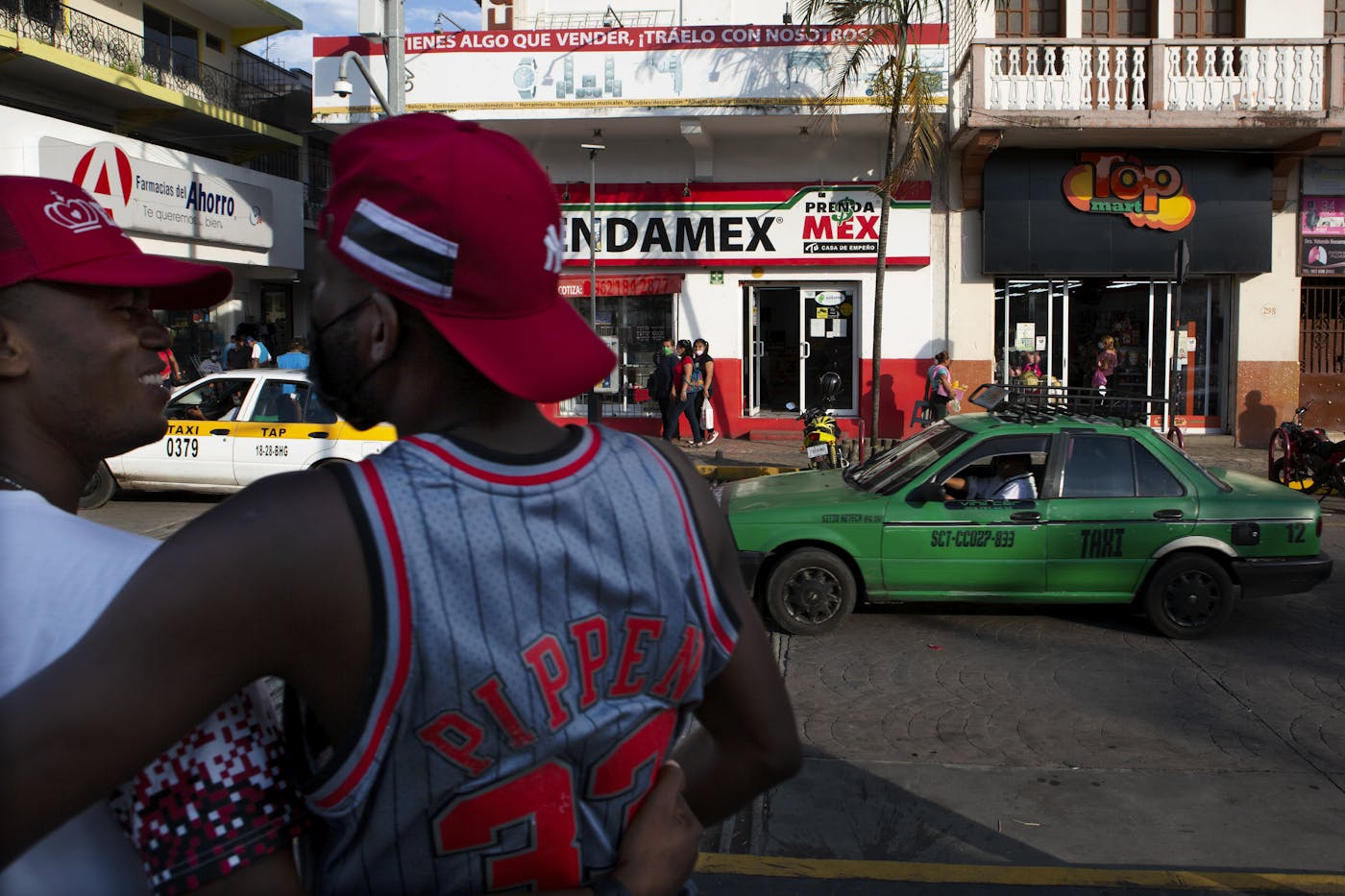
“There is a context of violence, economic crises, aggravated natural disasters in the region, political crises in Central and South America, so there is an influx of people that was predictable. Mexico as a transit and destination country and the U.S. as a destination country have not come up with a comprehensive, humanitarian response to this,” said Yuriria Salvador, coordinator for structural change at the Fray Matías de Córdova Human Rights Center in Tapachula. “Their response is instead to continue externalizing the U.S. borders. Mexico is a containment belt for people migrating in search of international protection.”
The majority of the Haitian asylum-seekers now stalled in Mexico have come north after multiple years in Chile or Brazil, where anti-immigrant politicians Sebastián Piñera and Jair Bolsonaro have made life for Haitians excessively difficult in terms of paperwork, jobs, and day-to-day racism. (The economic impact of the pandemic didn’t help.) Many of the Haitians are families with young children, and most came through the Darién Gap, the 66-mile-long jungle separating Colombia and Panama. When they get to Tapachula, most have to stay for months. There are now Haitian restaurants, barbershops, and other stores catering to the community.
The head of Comar, Andrés Ramírez, recently stated that “the Haitians are not really refugees in our point of view,” disqualifying their applications before they even get a chance to submit them. That hasn’t stopped Haitians from following the process, however. In August, so many people registered with Comar’s online application system that it crashed, and the first step of the process had to switch to in-person at Tapachula’s Olympic stadium. (The online system had originally been set up to deal with the overflow of people at Comar’s main office in the city.)
Each morning, up to 5,000 people line up to register and receive an interview date to determine whether they qualify for refugee status. The registration opens at 8 a.m., but there are so many people that most come before 5 a.m. to secure a place in line, which by opening time stretches in loops around the parking lot of the stadium as the tropical sun rises. There are only two portable bathrooms serving the thousands of asylum-seekers. One young man from the Dominican Republic said he had come twice and missed his opportunity to register for an interview, so on his third try he spent the night in the parking lot. He’s not the only one: Many wait overnight, often with small children.
Without refugee status, asylum-seekers aren’t allowed to work in Mexico. In order to survive, most Haitians rely on remittances from abroad as well as selling soft drinks, phone cards, and other items in the city center without permits; they must stay vigilant to avoid public inspectors who will impound the few goods they own and turn them over to the police. The threat of government raids that result in expulsions to Guatemala or, worse, deportation back to Haiti, looms over everyone’s heads. Many don’t leave the places where they sleep at night, and when police enter a park or square in the center of the town during the day, Haitians quickly run away. Even having your papers in order doesn’t rule out extortion, arrest, or deportation. “Expulsions are a tactic of terror and racism against Haitians in Tapachula,” said Andrew Bahena of CHIRLA, an L.A.-based immigrant rights organization that has a presence in Tapachula. “They can be detained anytime, anywhere, even when they’re buying diapers. The Mexican government does this to strike fear in their community.” Bahena sees a direct line from U.S. immigration policy: “This is a clear example of how anti-Blackness in U.S. immigration policy has emboldened Mexican authorities to adopt cruel and illegal tactics to deter Black asylum-seekers from reaching the U.S. border.”
Woldy Cajour, 26, and his wife, Carine Myrtil, 20, left São Paulo with their three-month-old daughter, Laura, earlier this year (they had previously fled their hometown of Les Cayes, Haiti). Even though they both had permanent resident cards in Brazil, Cajour’s work at a delivery warehouse only paid him between $150 and $200 a month. A friend who had successfully made the journey to the U.S. told him that if he stayed in Brazil, he would die poor, and that he should think of his daughter’s future and come to the U.S.
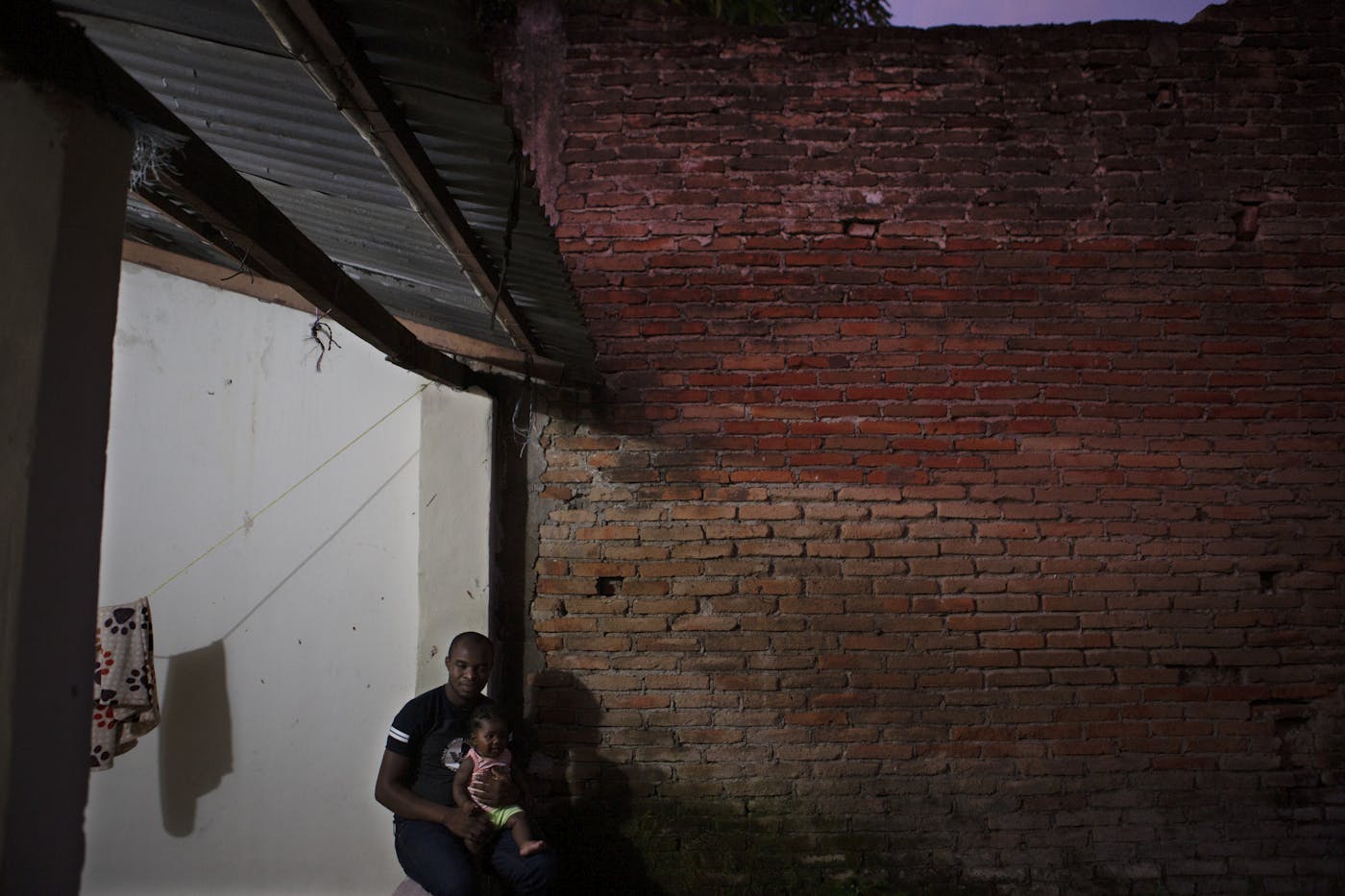
Together, the three of them made the overland trip and crossed the Darién Gap. Laura got sick from drinking river water in the jungle, and by the time they reached Tapachula, several days later, her diarrhea was serious. Cajour and Myrtil brought the baby to the hospital, but the doctors refused to treat her because the family didn’t have immigration papers. Laura is a little better now, but Cajour still worries about her health.
He found a job working in a clothing store owned by a man he met in church, and earns $5 a day. But, he said, other Mexicans have come up to the store owner to berate him for hiring a Haitian, and he thinks business has gone down because of Cajour’s presence. “It hurts to think about that. The racism here is too much,” he said. Cajour and Myrtil said their lives are at risk because of the violent gangs if they are sent back to Haiti.
With the Mexican government precluding refugee status for Haitians, and the Biden administration maintaining Title 42, it’s likely that in the next few months, tens of thousands of Haitians will be facing deportation orders in southern Mexico, and it’s unclear if the Mexican government even has the capacity to carry them out. Advocates now worry about widespread starvation among the asylum-seekers.
It’s not only Haitians who are stuck like this. Paul and Veronica (whose names have been changed to protect their identities), two asylum-seekers from Cameroon and Liberia, respectively, crossed the Darién gap in harrowing journeys, then met and became close because they both spoke English. The pair now stay in an office attached to a Mexican family’s home that was rented to them via a network of Cameroonian friends. They sleep on mattresses on the floor behind a desk for $25 a month each and find meals with a group of about 50 Ghanaians who frequent a restaurant selling kenkey and other Ghanaian dishes. Since they don’t speak Spanish, they have had a difficult time finding basic information. Veronica had met someone while sitting in a park who said he worked with the government and charged people to “expedite their paperwork,” so she paid him to put her name on his list, but Mexican officials outside Comar’s offices later told her it was one of the many scams targeting migrants in the city. “This town is a prison for us. The only thing we think about is how to leave,” Paul said.
Title 42 has opened the door for more abuses by both American and Mexican authorities. Every day, both countries send deportation and expulsion flights to Tapachula’s airport (there were 49 in September alone, according to Witness at the Border), where Mexican national guardsmen usher Central American families and single men into buses and take them south to the Mexico-Guatemala border. Sometimes they drive the buses into Tecún Umán, the Guatemalan border town, and drop them off with Guatemalan authorities, but often they force them to walk across the bridge separating the two countries. Some immigration advocates believe authorities do this to keep the deportations and expulsions off the books.
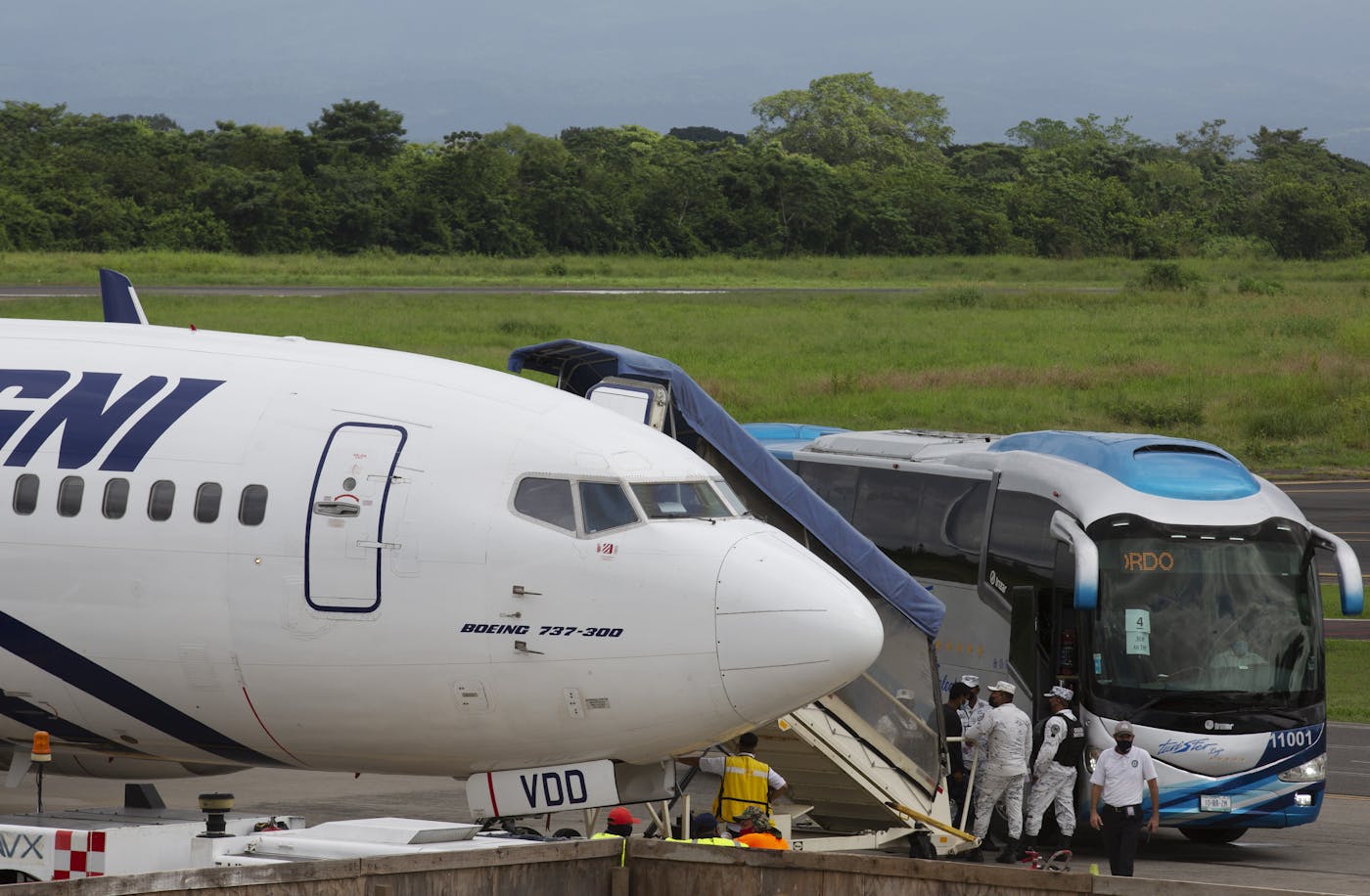
Marisol, a young Guatemalan woman whose name has been changed for her protection, told me that after she spent six days in the desert between the Mexican state of Juarez and Texas, U.S. Border Patrol detained her on the side of a road. She said they pointed a gun to her head and told her, “If you run, I will shoot you.” (Her account echoes other stories of abuse by Border Patrol agents obtained by Human Rights Watch and published last week.) She was returned to Juarez three days later, then sent on to Tapachula and Tecún Umán. When she asked the Mexican authorities for asylum, they told her she doesn’t have the right to do so.
It’s no coincidence that the countries with the largest populations of asylum-seekers heading to the U.S. have also experienced American interventions or are currently reeling from U.S. sanctions: Honduras, Cuba, Venezuela, and of course, Haiti. Haiti faces rampant kidnappings, political turmoil from the assassination of former President Jovenel Moïse this summer, and the wreckage of a devastating earthquake. Former Biden administration special envoy to Haiti Daniel Foote, who resigned over the Del Rio deportations, told members of Congress in a briefing that “the security situation, the economic situation, the health situation are all grave in Haiti right now.”
“Haiti as a country can’t support the people it has there right now,” he stated. “The last thing they need is desperate people without anything to their names because they just spent everything trying to get to the States, coming back. There’s no safety net.”
Foote argued that U.S. interference in politics in Haiti was a major driver of the instability that causes migration. “The Haitian people do not believe they have had a voice in their destiny and in selecting their leaders,” he said, casting doubt on the legitimacy of the elections of Haiti’s last two presidents, Michel Martelly and Moïse, and noting that the Biden administration seems bent on repeating the harmful policies of the last decades by supporting interim President Ariel Henry against the will of the Haitian people.
Guerline Jozef believes the roots go deeper. “We are still seeing the aftereffects of colonialism. We are still seeing the result of Haiti fighting for independence and being made to pay for lost wages from slavery to France that Haiti could’ve used to build infrastructure,” Jozef said. “Haiti’s poverty is a direct creation of the United States, of France, of the other superpowers of the world.”
If U.S. policy has created a disaster in Haiti, U.S. policy and pressure on Mexico and other Central American countries has created a situation where Haitians can’t pursue a dignified life elsewhere. “We Haitians don’t need humanitarian help like giving us grains,” Junior, the asylum-seeker, told me. “We need conscious humanitarian help so we can develop our own country and be in charge of our own destiny. When we want to feed ourselves and take care of ourselves, we suffer political instability, and when there’s political instability, we can’t do anything and we’re in danger. We need our autonomy.”
